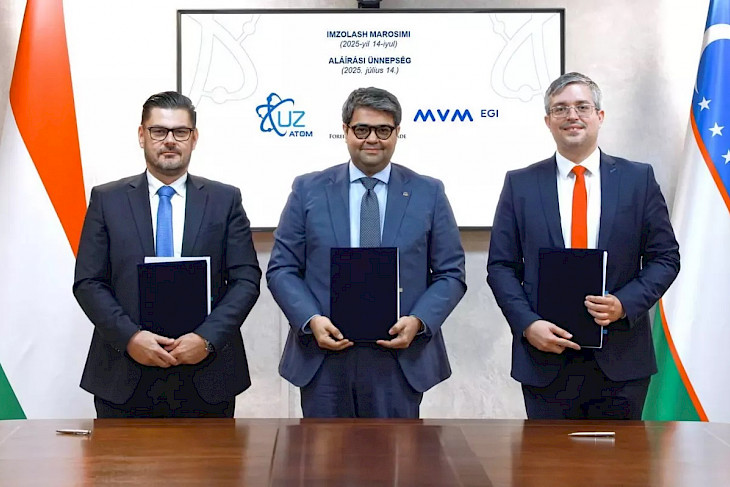Uzbekistan and Hungary have taken a significant step toward strengthening their strategic partnership in nuclear energy. During the official visit of a Hungarian delegation to Tashkent, Uzbekistan’s Uzatom Agency, the Hungarian Ministry of Foreign Affairs and Trade, and the Hungarian energy company MVM EGI Zrt. signed a protocol outlining key areas of cooperation on a nuclear power plant (NPP) project, the statement of Uzatom says.
According to Uzatom’s press service, the signed document formalizes a series of joint commitments, including:
-
the use of dry cooling systems with mechanical draft;
-
development and delivery of technical and commercial proposals for equipment supply;
-
the establishment of a joint venture in Uzbekistan for modular assembly of nuclear components;
-
implementation of Hungarian educational programs and internships to train local specialists.
As part of the trilateral talks in Tashkent involving Hungarian and Russian energy firms, the parties also discussed component localization within free economic zones and the creation of necessary infrastructure to support long-term cooperation.
Complementing Russia’s Role in Uzbekistan’s Nuclear Plans
The agreement with Hungary comes as Uzbekistan simultaneously expands its partnership with Russia’s Rosatom. In May 2024, Uzatom and Rosatom signed a contract to build a 330 MW small modular reactor (SMR) plant in the Jizzakh region, using six RITM-200N reactors. Construction began in April 2025, with phased commissioning expected between 2029 and 2033.
Further, at the St. Petersburg International Economic Forum in June 2025, the two sides signed an agreement on a feasibility study for a larger VVER-1000 NPP with two reactor units and potential future expansion to four.
Joint production efforts are already underway: Russian and Uzbek companies have launched steel casting and equipment manufacturing for the SMR project.
A Multilayered Nuclear Strategy
Uzbekistan’s approach combines the technological strengths of both partners - Hungary’s dry cooling systems and training programs, and Russia’s expertise in modular and large-scale nuclear construction. By integrating diverse technologies and industrial cooperation models, Uzbekistan is building a flexible, multi-tiered nuclear energy strategy to meet its growing power demands and enhance energy security.
CentralasianLIGHT.org
July 15, 2025

